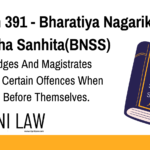Code: Section 394 BNSS
Residence Notification for Convicts
(1) When any person, having been convicted by a Court in India of an offence
punishable with imprisonment for a term of three years, or upwards, is again convicted of
any offence punishable with imprisonment for a term of three years or upwards by any
Court other than that of a Magistrate of the second class, such Court may, if it thinks fit, at
the time of passing a sentence of imprisonment on such person, also order that his residence
and any change of, or absence from, such residence after release be notified as
hereinafter provided for a term not exceeding five years from the date of the expiration of
such sentence.
(2) The provisions of sub-section (1) shall also apply to criminal conspiracies to
commit such offences and to the abetment of such offences and attempts to commit them.
(3) If such conviction is set aside on appeal or otherwise, such order shall become
void.
(4) An order under this section may also be made by an Appellate Court or by the
High Court or Court of Session when exercising its powers of revision.
(5) The State Government may, by notification, make rules to carry out the provisions
of this section relating to the notification of residence or change of, or absence from,
residence by released convicts.
(6) Such rules may provide for punishment for the breach thereof and any person
charged with a breach of any such rule may be tried by a Magistrate of competent jurisdiction
in the district in which the place last notified by him as his place of residence is situated
Explanation of Section 394 BNSS
Section 394 deals with the notification of residence for convicts who have been sentenced to imprisonment for three years or more. This is a mechanism to ensure that certain convicted individuals are tracked after their release from prison, particularly for serious offences. It is a preventive measure to help authorities monitor and manage the risk of recidivism.
Key Provisions:
- Notification of Residence Post-Conviction
If an individual is convicted of a serious offence and sentenced to imprisonment for three years or more, and later convicted again for a similar or related offence (punishable with imprisonment for three years or more), the Court may order that:- Their residence be notified after release from prison.
- Any change of residence or absence from the notified residence also be reported.
- The notification period is up to five years after the expiration of the sentence.
- Applicability to Attempts and Conspiracies
The provisions also apply to those convicted of criminal conspiracies, abetment, or attempts to commit such serious offences. - Setting Aside Conviction
If the conviction leading to the residence notification is set aside on appeal or otherwise, the order for the residence notification becomes void. - Appeal and Revision
The order for residence notification can also be made by an Appellate Court, the High Court, or a Court of Session during its revision powers. - State Government Rules
The State Government is authorized to make rules related to the notification of residence of released convicts. These rules will specify how residence changes should be notified and may also impose penalties for non-compliance. - Punishment for Breach
If a person breaches any of the rules related to residence notification, they may be charged and tried by a Magistrate of competent jurisdiction in the area where they last notified their residence.
Illustrations
Example 1: Repeated Conviction
- An individual convicted of robbery (punishable with imprisonment for 5 years) is later convicted of theft (also punishable with imprisonment for 3 years).
- The Court may order that their residence be notified for up to five years after their release.
Example 2: Appeal and Cancellation
- If the conviction of the individual mentioned above is later overturned on appeal, the residence notification order becomes void, and they are no longer required to notify their residence.
Example 3: Punishment for Breach
- A released convict fails to notify a change of residence as per the Court’s order.
- They are charged and tried by a Magistrate in the district where they last notified their residence.
Common Questions and Answers on Section 394 BNSS
1. Why does the Court impose a residence notification order?
The residence notification is aimed at monitoring individuals who have committed serious offences and been convicted multiple times. It helps ensure that these individuals do not repeat crimes and remain accountable to law enforcement after their release.
2. Can a Court order the residence notification for any convict?
No, the residence notification can only be ordered for individuals convicted of an offence punishable with imprisonment for three years or more, especially those convicted repeatedly.
3. What happens if the residence notification order is violated?
If the convict fails to comply with the notification rules, they can face legal action and be tried by a Magistrate for the breach, as per the rules made by the State Government.
Conclusion
Section 394 of the Bharatiya Nyaya Sanhita (BNSS) introduces measures to monitor the residence of serious convicts after their release. This not only ensures the rehabilitation of convicts but also helps prevent recidivism. By making it mandatory to notify any change of residence for up to five years, the law provides a safeguard for public safety.








